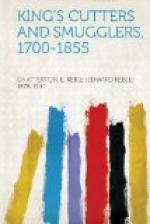On that the men of St. Thomas ceased rowing, drew in their oars, and rushed aft to where the steersman was standing in the stern. Matters began to look ugly, and being convinced that these men were bent on desperate resistance, Mr. Stewart was compelled to fire with his pistol at the steersman, who immediately fell. Stewart instantly leapt aboard, but was nearly jostled into the sea by two of the enemy. He ordered the whole of this crew to go forward, but they declined to obey, and followed this up by threatening that if they still refused he would have to use his sword and cut them down. The only member of his own crew who had already got aboard as well was his coxswain, and owing either to himself or the action of the coxswain in stepping from one boat to the other, the two craft had drifted apart, and for a time there was considerable risk that the men, who were obvious smugglers, would fall on these two. But the naval officer had already cut down two of their number with his sword, and after that the rest went forward and were obedient. The St. Thomas was rather a large craft of her kind. Additional to her sails, she rowed five on one side, six on the other, and also had a steersman, the additional oarsman being no doubt placed according to the tide so that his work might in some measure counteract the great leeway which is made by small vessels crossing the strong tidal stream of the English Channel.
As all was now quiet on board, Mr. Stewart searched her and found she was laden with kegs, which, said the crew, were filled with tea and tobacco, these kegs being as usual already slung for putting ashore or sinking. Later on it was found that out of this crew no less than six were English, besides one man who had been born at Flushing of English parentage, though he called himself a Dutchman. The rest were all foreigners. No one can read such an incident as this without regretting that they should have ever led to slaughter. It is a serious thing to take any man’s life when there is no warfare, and it is still more dismal if that man is of the same nationality as the one who deals death. If the whole of the St. Thomas’s crew had been killed there could have been no blame on Mr. Stewart, for he was only carrying out his orders and acting in self-defence. The smugglers were fully aware they were in the wrong, and they were responsible for any consequences that might accrue. The officer had given them ample warning, and he had only used severe measures when absolutely compelled.
But there is a more satisfactory side to this regrettable incident, which one is only too glad to be able to record. The man who had been so badly wounded desired to speak to Mr. Stewart, and when the latter had approached him he turned to him and said:
“You’ve killed me; sir, I’m dying.”
Mr. Stewart saw that this was perfectly true, and that the man was in no sense exaggerating.




